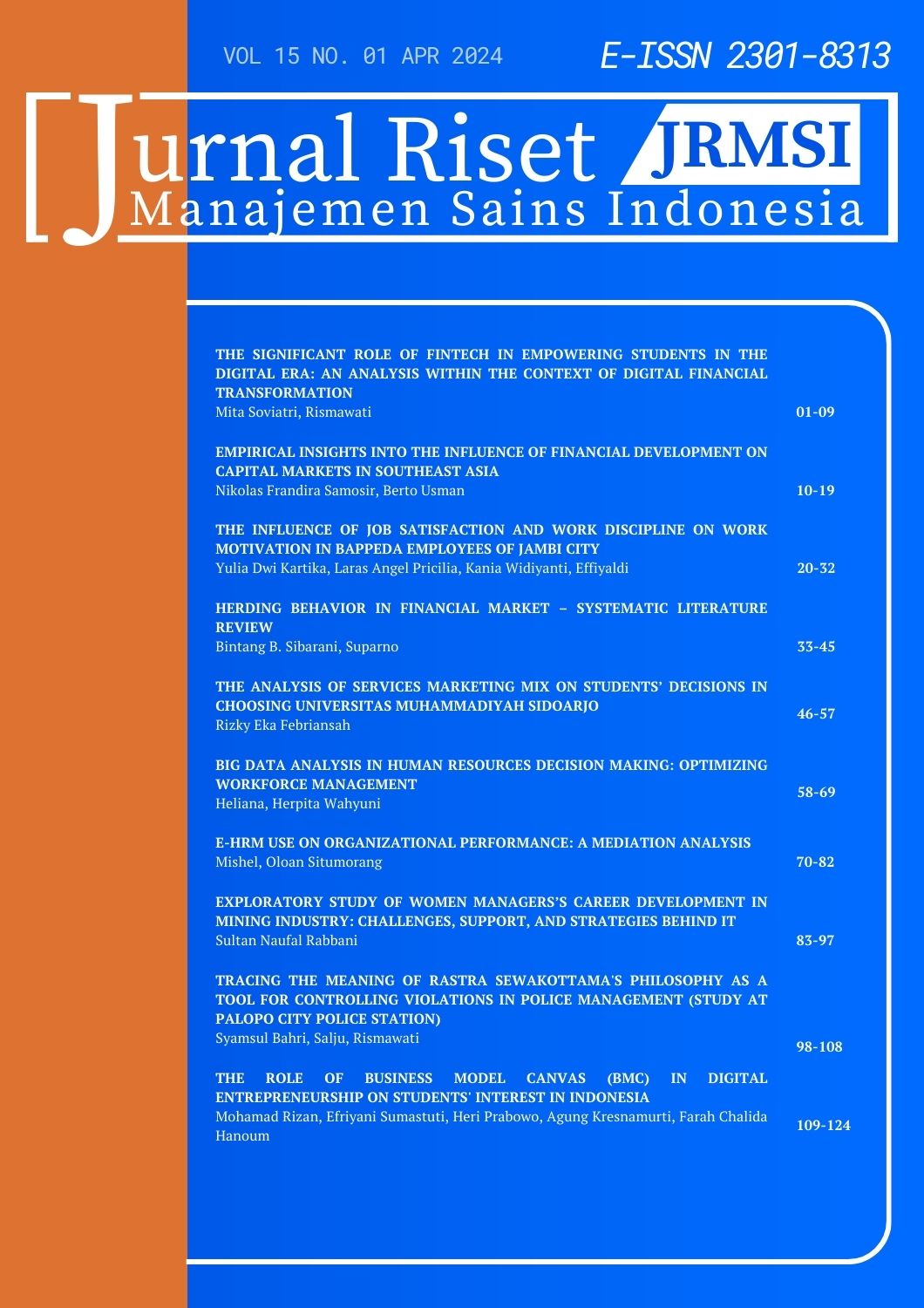TRACING THE MEANING OF RASTRA SEWAKOTTAMA'S PHILOSOPHY AS A TOOL FOR CONTROLLING VIOLATIONS IN POLICE MANAGEMENT (STUDY AT PALOPO CITY POLICE STATION)
DOI:
https://doi.org/10.21009/JRMSI.015.1.09Keywords:
Rastra Sewakottama, Human Resource Management, Code of Ethics, Violation of LawAbstract
This study aims to reveal the meaning of Rasta Sewakottama in human resource management at Palopo City Police Station. Using qualitative phenomenological methods, this research found that to improve organizational performance, reduce violations of laws and violations of the code of ethics required collective awareness, a sense of responsibility, respect for differences and self-development. This can be achieved optimally by the example of the leader and the ability of the Human Resources unit to place personnel. Formation is done through weekly activities such as spiritual guidance and counseling. In addition, optimization of information systems is used by the National Police to monitor the performance of each personnel. The meaning of the philosophy of Rasta Sewakottama according to the Palopo City Police Chief is the deepest awareness of all police members to carry out state duties as guardians of public order and security. Through this personal awareness, the potential for violating the code of ethics and other violations of the law can be minimized.
References
Alfian, E. (2020) ‘Tugas dan Fungsi Kepolisian Untuk Meningkatkan Kepercayaan Publik terhadap Penegak Hukum’, Legalitas: Jurnal Hukum, 12(1), p. 27. doi: 10.33087/legalitas.v12i1.192.
Anwar, A. R. H. (2017) ‘Pendidikan pembentukan Bintara Polri Dalam Menyiapkan Lulusan Yang Profesional’, Sosiohumanitas, 19(1), pp. 1–15. Available at: http://journal.unla.ac.id/index.php/sosiohumanitas/article/view/84.
Christian, A. (2023) ‘Analisis Pelanggaran Kode Etik Profesi Polri Sebagai Lembaga Penegak Hukum Di Indonesia’, Lex Administratum, 11(2).
Dwi, N. et al. (2022) ‘Efektivitas Pembinaan Terhadap Anggota Polri Yang Melakukan Pelanggaran Disiplin Dan Pelanggaran Kode Etik Profesi Polri (Studi Di Polresta Mataram) the Effectiveness of Development on Polri Members Who Break the Discipline and Violate the Polri Professio’, Unizar Recht Journal, 1(2).
Dwi, S. M., Siahaan, A. and Neliwati (2023) ‘Implementasi Manajemen Pendidikan Karakter Pada Siswa Pendidikan Pembentukan ( DIKTUK )’, 9(1), pp. 6–14.
Hartini, H., Rugaiyah, R. and Kahar, A. (2020) ‘Evaluasi Program Pendidikan Pengembangan Spesialisasi Polri T.a. 2018 Di Sekolah Pimpinan Tingkat Pertama Polri’, Visipena, 11(2), pp. 416–426. doi: 10.46244/visipena.v11i2.1299.
Kristian, D. et al. (2021) ‘Kewenangan Polri Dalam Menegakkab Kode Etik Anggota Polri Yang Melakukan Tindak Pidana Narkoba’, Jurnal USM Law Review, 4(2), pp. 663–671.
Kurniawan, Y., Siregar, T. and Hidayani, S. (2022) ‘Penegakan Hukum Oleh Polri Terhadap Pelaku Tindak Pidana Judi Online (Studi Pada Kepolisian Daerah Sumatera Utara)’, ARBITER: Jurnal Ilmiah Magister Hukum, 4(1), pp. 28–44. doi: 10.31289/arbiter.v4i1.1203.
Mahmudah, F. N. and Putra, E. C. S. (2021) ‘Tinjauan pustaka sistematis manajemen pendidikan: Kerangka konseptual dalam meningkatkan kualitas pendidikan era 4.0’, Jurnal Akuntabilitas Manajemen Pendidikan, 9(1), pp. 43–53. doi: 10.21831/jamp.v9i1.33713.
Nugroho, Y. A. (2022) ‘Implementasi Pendidikan Karakter Kebangsaan dalam Kegiatan Prarekruitmen dan Seleksi Personel Polri di Polda Papua’, Journal Of Public Policy and Applied Administration, 4(2), pp. 23–38.
de Oliveira, M. A. et al. (2021) ‘Project performance prediction model linking agility and flexibility demands to project type’, Expert Systems, 38(4), pp. 1–27. doi: 10.1111/exsy.12675.
Pratama, R. M. and Yanuar, F. (2022) ‘Persepsi Mahasiswa Fikom Usahid Atas Polri Terkait Kasus Ferdy Sambo’, pp. 570–579.
Ridwan, A. (2021) Pengaruh Budaya Organisasi, Gaya Kepemimpinan Dan Motivasi Terhadap Kinerja Personel Satuan Lalu Lintas Polres Halmahera Barat (Doctoral dissertation, Universitas Mercu Buana Yogyakarta).
Rosmala and Thoyyibah, I. (2023a) ‘Analisis pelangaran kode etik humas polri (studi kasus ferdy sambo)’, 5(2).
Rosmala and Thoyyibah, I. (2023b) ‘Analisis Pelangaran Kode Etik Humas Polri (studi kasus Ferdy Sambo)’, 5(2).
Santoso, J., Haryanto, A. and Darmawan, A. B. (2018) ‘Urgensi Kurikulum ASEAN Pada Pendidikan Bintara Polri Dalam Menanggulangi Kejahatan Transnasional Untuk Ketahanan Nasional’, Jurnal Ketahanan Nasional, 24(1), p. 27. doi: 10.22146/jkn.30903.
Saparyanto et al. (2023) ‘Kedudukan komisi kode etik polri dalam penegakan kode etik profesi polri perspektif kepastian hukum’, Badamai law journal, 7(1), pp. 113–133.
Shallom Jeremiah, K. and Hasiyanni Manurung, K. (2022) ‘Analisis Perbuatan Obstruction of Justice Yang Dilakukan Oleh Aparat Kepolisian Dalam Perkara Pembunuhan Berencana’, Jurnal Esensi Hukum, 4(2), pp. 99–111.
Sitaresmi (2020) ‘Bintara Polwan ( Studi Pada Sepolwan Lemdiklat Polri )’. Jakarta: Universitas Negeri Jakarta, pp. 73–85.
Soelton, M. et al. (2023) ‘To improve the quality management of children welfare institutions and provide better services’, Quality - Access to Success, 24(195), pp. 295–302. doi: 10.47750/QAS/24.195.35.
Sujanto, R. Y. (2019) Pengantar Public Relations di era 4.0. Yogyakarta: Pustaka Baru Press.
Ubwarin, E. and Wattimury, E. (2021) ‘Analisa Yuridis Pertimbangan Komisi Kode Etik Profesi Polri Terhadap Anggota Yang Telah di Vonis Bersalah Melakukan Tindak Pidana (Studi Pada Komisi Kode Etik Profesi Polri Polda Maluku)’, Jurnal Belo, 7(2), pp. 173–198.
Weyland, A. (2011) ‘How to attract people who are in sync with your culture’, Human Resource Management International Digest, 19(4), pp. 29–31. doi: 10.1108/09670731111140739.
Wulandari, P. U. et al. (2023) ‘Restorasi Citra Organisasi Kepolisian Republik Indonesia Tahun 2022’.
Yuridis, A. et al. (2021) ‘Analisa Yuridis Pertimbangan Komisi Kode Etik Profesi Polri Terhadap Anggota Yang Telah di Vonis Bersalah Melakukan Tindak Pidana’, Jurnal Belo, 7(1), pp. 173–198.
Yusuf, M. N. and Yulianeu, A. (2023) ‘Energizing Organizational Learning and Organizational Performance: Human Capital Theory Perspective’, Quality - Access to Success, 24(192), pp. 82–93. doi: 10.47750/QAS/24.192.11.
Downloads
Published
How to Cite
Issue
Section
License

Articles in Jurnal Riset Manajemen Sains Indonesia are Open Access articles published under the Creative Commons CC BY-NC-SA License. This license permits use, distribution and reproduction in any medium for non-commercial purposes only, provided the original work and source is properly cited. Any derivative of the original must be distributed under the same license as the original.











